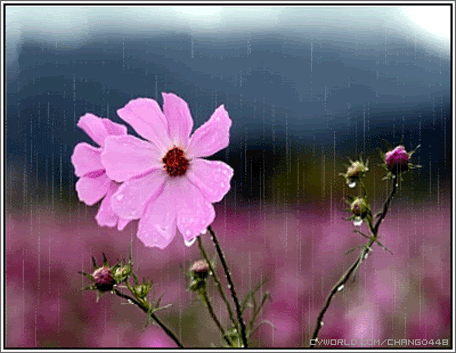-
44 April 15, 2016
-
Don’t Give Up
63 April 15, 2016Don’t let today’s troubles
Bring you down,
Or allow you to question
Your abilityDon’t let life’s little obstacles
Keep you from trying,
Or become the reason
For defeatDon’t let your fears
Keep you from dreaming,
Or from chasing
your dreamDon’t give up for any reason
Believe in yourself,
And in yourself
You’ll find strength~The Poetry Pad
-
The Story of Garahadinna
Comment April 14, 2016Verses 58 – 59: As a sweet-smelling and beautiful lotus flower may grow upon a heap of rubbish thrown on the highway, so also, out of the rubbish heap of beings may appear a disciple of the Buddha, who with his wisdom shines forth far above the blind (ignorant) worldlings.
1. sankarabhutesu: rubbish heap of beings.
2. andhabhute puthujjane: blind worldlings. The worldlings are like the blind because they are lacking in knowledge.
The Story of Garahadinna
While residing at the Jetavana monastery, the Buddha uttered Verses (58) and (59) of this book, with reference to a rich man named Garahadinna and the miracle of the lotus flowers.
There were two friends named Sirigutta and Garahadinna in Savatthi. Sirigutta was a follower of the Buddha and Garahadinna was a follower of the Niganthas, the ascetics who were hostile to the Buddhists. At the instance of the Niganthas, Garahadinna often said to Sirigutta, “What benefit do you get by following the Buddha? Come, be a follower of my teachers.” Having been told thus many times, Sirigutta said to Garahadinna, “Tell me, what do your teachers know?” To this, Garahadinna replied that his teachers knew everything; with their great power they knew the past, the present and the future and also the thoughts of others. So, Sirigutta invited the Niganthas to his house for alms-food.
Sirigutta wanted to find out the truth about the Niganthas, whether they really possessed the power of knowing other people’s thoughts, etc. So he made a long, deep trench and filled it up with excreta and filth. Seats were then placed precariously over the trench; and big empty pots were brought in and covered up with cloth and banana leaves to make them appear as if they were full of rice and curries. When the Niganthas arrived, they were requested to enter one by one, to stand near their respective seats, and to sit down simultaneously. As all of them sat down, the flimsy strings broke and the Niganthas fell into the filthy trench. Then Sirigutta taunted them, “Why don’t you know the past, the present and the future? Why don’t you know the thoughts of others?” All the Niganthas then fled in terror.
Garahadinna naturally was furious with Sirigutta and refused to talk to him for two weeks. Then, he decided that he would have his revenge on Sirigutta. He pretended that he was no longer angry, and one day asked Sirigutta to invite, on his behalf, the Buddha and his five hundred disciples to partake of alms-food. So Sirigutta went to the Buddha and invited him to the house of Garahadinna. At the same time, he told the Buddha about what he had done to the Niganthas, the teachers of Garahadinna. He also expressed his fear that this invitation might be a reprisal and so the invitation should be accepted only after due consideration.
The Buddha, with his supernormal power, knew that this would be the occasion for the two friends to attain Sotapatti Fruition, and therefore accepted the invitation. Garahadinna made a trench, filled it with live coals and covered it with mats. He also kept some empty pots covered with cloth and banana leaves to make them appear as if filled with rice and curries. The next day, the Buddha came followed by five hundred bhikkhus in single file. When the Buddha stepped on the mat over the trench, the mat and live coals miraculously disappeared, and five hundred lotus flowers, each as large as a cart wheel, sprang up for the Buddha and his disciples to sit upon.
Seeing this miracle, Garahadinna was very much alarmed and he said rather incoherently to Sirigutta, “Help me, dear friend. Out of my desire for revenge, I have truly done a great wrong. My bad designs have had no effect at all on your Teacher. The pots in my kitchen are all empty. Please help me.” Sirigutta then told Garahadinna to go and look at the pots. When Garahadinna found all the pots filled with food he was astounded and at the same time very much relieved and very happy. So the food was offered to the Buddha and his disciples. After the meal, the Buddha expressed his appreciation (anumodana) of the meritorious act and then said, “Ignorant worldlings, lacking in knowledge, do not know the unique qualities of the Buddha, the Dhamma and the Samgha and so they are like the blind; but the wise, having knowledge, are like people with sight.”
Then the Buddha spoke in verse as follows:
Verses 58 – 59: As a sweet-smelling and beautiful lotus flower may grow upon a heap of rubbish thrown on the highway, so also, out of the rubbish heap of beings may appear a disciple of the Buddha, who with his wisdom shines forth far above the blind (ignorant) worldlings.
At the end of the discourse, both Garahadinna and Sirigutta attained Sotapatti Fruition.End of Chapter Four: Flowers (Pupphavagga)
Dhammapada Verses 58 and 59
Garahadinna VatthuYatha sankaradhanasmim
ujjhitasmim mahapathe
padumam tattha jayetha
sucigandham manoramam.Evam sankarabhutesu1
andhabhute puthujjane2
atirocati pannaya
sammasambuddhasavako.Source: Tipitaka
-
Conquering all Distractions
Comment April 14, 2016As dusk fell, Devaputra Mara, the chief of all the demons, or maras, in this world, tried to disturb Siddhartha’s concentration by conjuring up many fearful apparitions. He manifested hosts of terrifying demons, some throwing spears, some firing arrows, some trying to burn him with fire, and some hurling boulders and even mountains at him. Through the force of his concentration, the weapons, rocks, and mountains appeared to him as a rain of fragrant flowers, and the raging fires became like offerings of rainbow lights.
Seeing that Siddhartha could not be frightened into abandoning his meditation, Devaputra Mara tried instead to distract him by manifesting countless beautiful women, but Siddhartha responded by developing even deeper concentration. In this way he triumphed over all the demons of this world, which is why he subsequently became known as a “Conqueror Buddha.”
With this concentration he removed the final veils of ignorance from his mind and in the next moment became a Buddha, a fully enlightened being.
Source: About Buddha
-
If we have true compassion in our hearts
Comment April 12, 2016The Dalai Lama has asked that the following practice be shared with as many people as possible.
A group spent days visiting with the Dalai Lama focusing upon what they believe are five most important questions to be considered.
The five questions were:
1. How do we address the widening gap between rich and poor?
2. How do we protect the earth?
3. How do we educate our children?
4. How do we help Tibet and other oppressed countries and peoples of the world?
5. How do we bring spirituality (deep caring for one another) through all disciplines of life?The Dalai Lama said all five questions fall under the last one. If we have true compassion in our hearts, our children will be educated wisely, we will care for the earth, those who “have not” will be cared for.
The group asked the Dalai Lama, “Do you think love on the planet is increasing or staying the same?” His response: “My experience leads me to believe that love is increasing.”
He shared a simple practice that will increase love and compassion in the world. He asked everyone in the group to share it with as many people as they can.
The Practice
1. Spend 5 minutes at the beginning of each day remembering we all want the same things (to be happy and to be loved) and we are all connected to one another.
2. Spend 5 minutes — breathing in — cherishing yourself; and, breathing out cherishing others. If you think about people you have difficulty cherishing, extend your cherishing to them anyway.
3. During the day extend that attitude to everyone you meet. Practice cherishing the “simplest” person (clerks, attendants, etc.), as well as the “important” people in your life; cherish the people you love and the people you dislike.
4. Continue this practice no matter what happens or what anyone does to you. These thoughts are very simple, inspiring and helpful. The practice of cherishing can be taken very deep if done wordlessly, allowing yourself to feel the love and appreciation that already exists in your heart.
Will you commit to creating Peace in yourself and thereby “On Earth” by spending 10 minutes a day with this simple meditation? Peace on Earth Good Will To All…
Not a season, It’s a daily practice.
Source: Highonlife1
-
Like the shining ones
Comment April 12, 2016 -
Know the sweet joy of living
Comment April 12, 2016There is no fire like greed,
No crime like hatred.
No sorrow like separation,
No sickness like hunger of heart,
And no joy like the joy of freedom.
Health, contentment and trust
Are your greatest possessions,
And freedom your greatest joy.
Look within, be still
Free from fear and attachment,
Know the sweet joy of living in the way.~Dhammapada
-
The Four Reliances
Comment April 12, 2016First, rely on the spirit and meaning of the teachings,
not on the words.Second, rely on the teachings,
not on the personality of the teacher.Third, rely on real wisdom,
not superficial interpretation.And fourth, rely on the essence of your pure wisdom,
not on judgmental perceptions.~ Traditional Buddhist Teaching
-
The Story of Thera Godhika
Comment April 12, 2016Verse 57: Mara cannot find the path taken by those who are endowed with virtue, who live mindfully and have been freed from moral defilements by Right Knowledge.1
- Arahats having eradicated moral defilements are no longer subject to rebirths; so Mara, for all his power, cannot find out where such arahats go after death. (The Commentary)
The Story of Thera Godhika
While residing at the Veluvana monastery, the Buddha uttered Verse (57) of this book, with reference to Thera Godhika.
Thera Godhika was, on one occasion, diligently practising Tranquillity and Insight Development, on a stone slab on the side of Isigili mountain in Magadha. When he had achieved one-pointedness of the mind (jhana) he became very ill; that impaired the effectiveness of his practice. In spite of his sickness, he kept on striving hard; but every time he was making some progress he was overcome by sickness. He was thus inflicted for six times. Finally, he made up his mind to overcome all obstacles and attain arahatship even if he were to die. So, without relaxing he continued to practise diligently; in the end he decided to give up his life by cutting his throat; at the point of death he attained arahatship.
When Mara learned that Thera Godhika had died, he tried to find out where the thera was reborn but failed to find him. So, assuming the likeness of a young man, Mara approached the Buddha and enquired where Thera Godhika was. The Buddha replied to him, “It will be of no benefit to you to learn of the destination of Thera Godhika; for having been freed of moral defilements he became an arahat. One like you, Mara, for all your power will not be able to find out where such arahats go after death.”
Then the Buddha spoke in verse as follows:
Verse 57: Mara cannot find the path taken by those who are endowed with virtue, who live mindfully and have been freed from moral defilements by Right Knowledge.
Dhammapada Verse 57
Godhikattheraparinibbana VatthuTesam sampannasilanam
appamadaviharinam
sammadanna vimuttanam
Maro maggam na vindati.Source: Tipitaka
-
Realize how blessed you are
Comment April 12, 2016


















